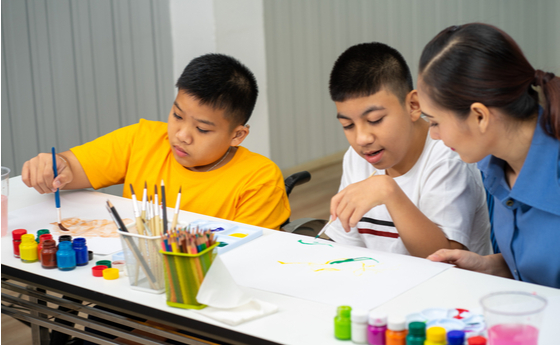- Emergency Ambulance Services
- 8606811111
- 0471-4077777, 0471-7177888
- gro@sutpattom.com
Autism – A Disease?
Thansi F. S, Child Development Therapist, SUT Hospital, Pattom
Raising a child with autism is one of the difficult things a family would face. Today we can help children with autism more than ever before. ‘Autism’ is not a disease, it is a condition. Every year, April 2 is celebrated as ‘Autism Awareness Day’ around the world with the aim of educating our community about autism and conveying the great message that children with autism should not be isolated by society and that they should be treated as one of us.
Autism is a disorder that is affecting more and more children. Autism cannot be diagnosed in the early stages of birth. It is identified through the behavioural changes in children. Some of the symptoms that children with autism manifest in their daily lives set them apart from other children. Parents need to be made fully aware of the condition ‘autism’ in order to understand the problems of children and thereby helps to develop their abilities accordingly.
‘Autism’ is an organic neurodevelopmental disorder that causes social, communication and intellectual problems. The symptoms vary in each child. This disorder is mostly affects boys. Structural and function abnormality of brain causes Autism.
By the age of three, a child can be diagnosed with autism. Parents should ensure that the growth and development of their children is proportionate to their age. If they are not properly monitored, it may results in the delayed treatment. Early detection and treatment of autism in children can help them to make better progress.
SymptomsChildren with autism do not look or interact with others in the early stages. People with such behavioural disorders may not be interested in anything and may not respond lovingly to caregivers. Do not laugh at acquaintances with parents and other loved ones. Speech impairment is another major symptom of autism in children. They repeatedly say certain words which are not suitable for the situation. Speech development first develops and then abruptly decreases. Some children with autism do not pay attention when someone talks to them. But a group of children with autism often show closeness to acquaintances and strangers alike. They will not feel fear or anxiety in case of their parents is not around unlike other children. They show interest in loneliness than to be with someone. Most of them wander in their own world all the time. They attack and hurt others without any provocation. Behaviours like smile, cry, anger and stubbornness without any reason might see in children with autism. They have strange movements such as constantly moving and swinging their hands.
Covid period and AutismSymptoms of autism have been on the rise in children for the past two years. As mentioned earlier, communication influences the children in various ways. However, during this Covid period, infants were confined within four walls and the use of mobiles, TVs and computers increased, leading to an increase in autism symptoms in infants. Babies do not have to be confined within four walls. It is essential that children take appropriate precautions (e.g., masks, social distance) to allow them to interact with others. Nursery and day care plays an important role in developing personality in children. Language development in children is facilitated by interaction with peers. At the same time, it enables them to do their basics things by own. Parents should find time to play with their children. Training can be made easier through games. Their likes and dislikes are expressed while playing, this helps the parents for giving them proper training.
Some important autism indication questions are as follows:1. Does your child look at your face when you speak?
2. Do the child pointing his finger at an object that he wants?
3. Reluctant to play with peers?
4. Is there any difficulty to communicate?
5. Do he dislike toys or excess interest to a particular toy?
6. Do the child pay attention when called by name?
7. Is he intolerant to certain types of sounds (eg: mixi, cooker)?
8. Do he make excessive noise?
9. Do the child have a habit of repeating what he hears?
10. Do you find your child immersed in a world of his or her own?
If any of the above reference questions seem to be ‘yes’ when the child is being monitored, the child should be screened for autism.
Therapy for autism is a very diverse field. The co-operation of parents, therapists and special educators is also needed to help children with autism. Early training, special education, behaviour therapies, and family support helps to formulate the language and behaviour of children with autism. This paves way to lead them a normal life.









